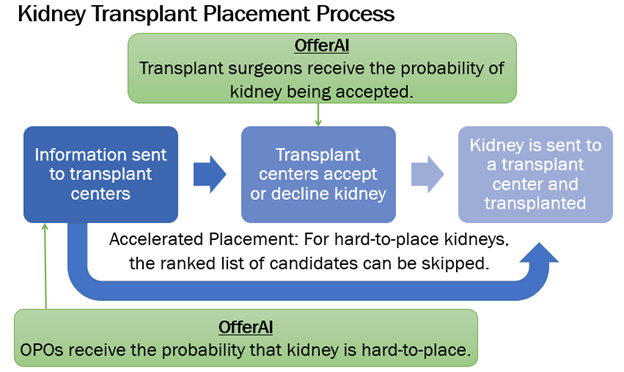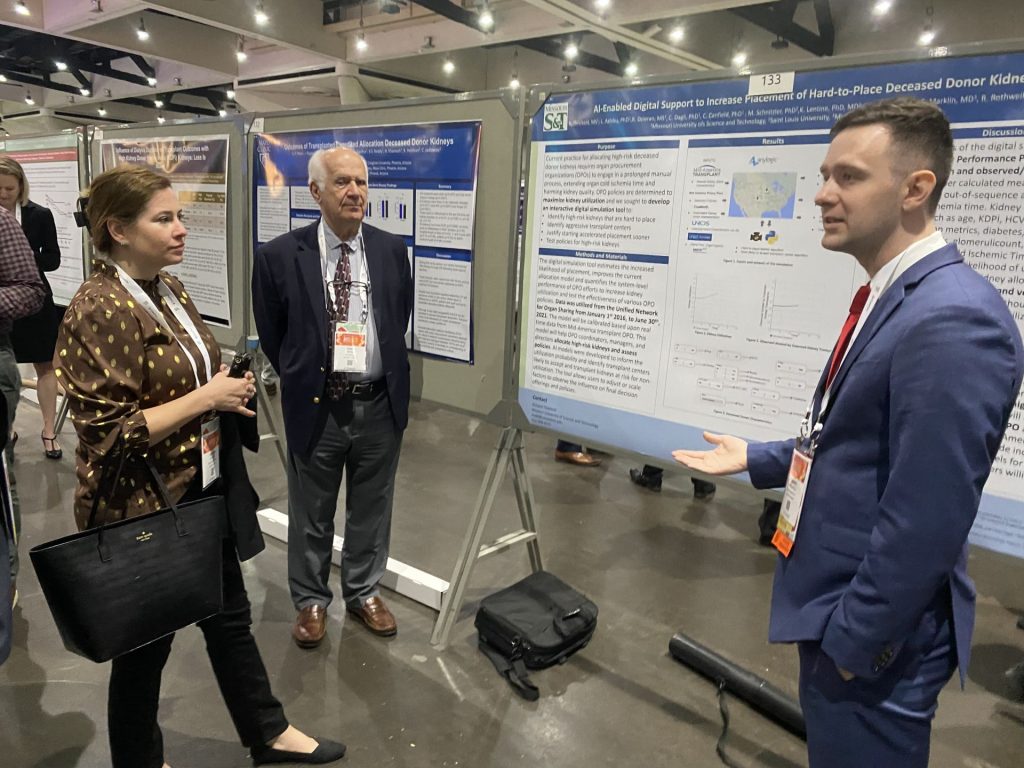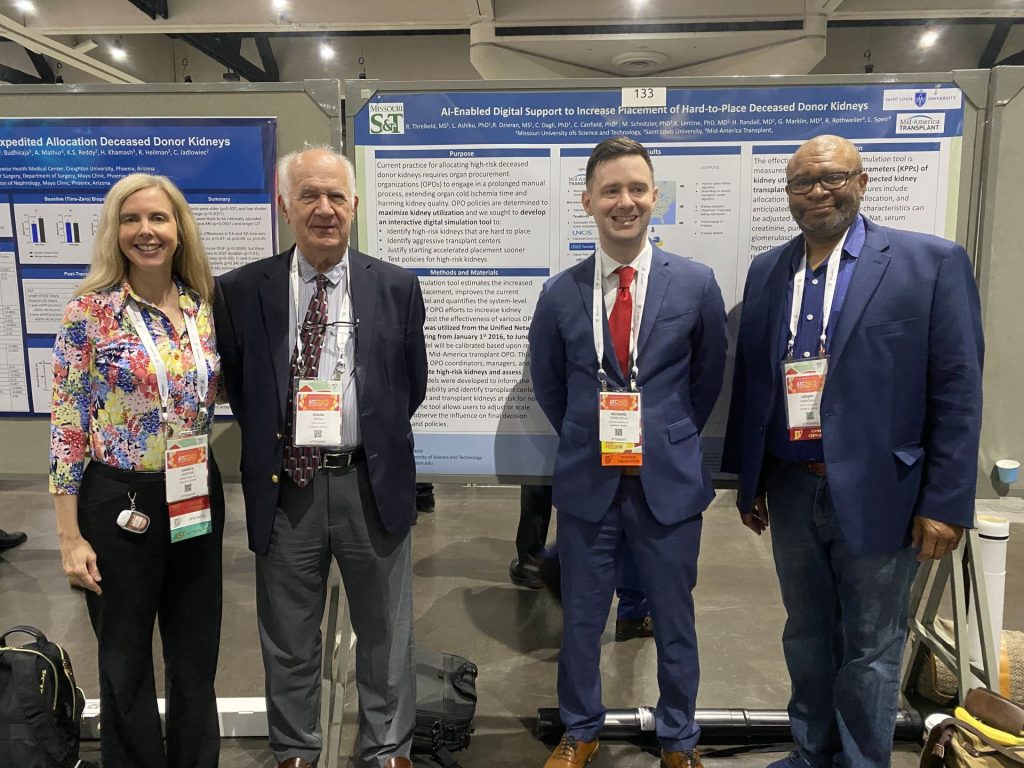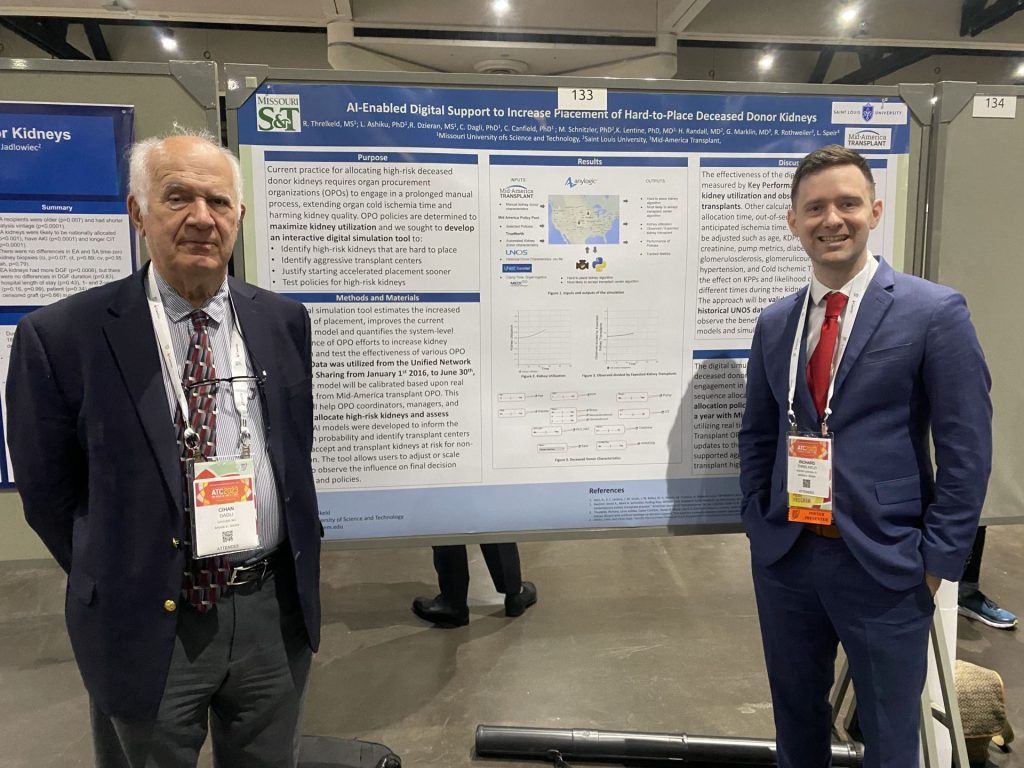Our team of researchers at Missouri S&T, Saint Louis University, and United Network for Organ Sharing was awarded a $1.8M research grant from the National Science Foundation.
Check out the press release!
Collaborative Research: FW-HTF-R: Embedding Preferences in Adaptable Artificial Intelligence Decision Support for Transplant Healthcare to Reduce Kidney Discard
Overview. Transplantation provides patients suffering from end-stage kidney disease a better quality of life and long-term survival. However, approximately 20% of deceased donor kidneys are discarded and never transplanted. While some discards may be medically appropriate, others reflect missed opportunities. Even kidneys deemed less desirable may provide survival benefits to some recipients. Organ Procurement Organizations (OPOs) have great difficulty finding transplant centers to accept less medically desirable (or higher risk) kidneys. At their discretion, OPOs can use accelerated placement to bypass the priority list for “hard-to-place” kidneys. However, due to a lack of data-driven guidance, this mechanism is not systematically applied and likely underutilized.
To enable transformative change, we propose to integrate Artificial Intelligence (AI) decision support into the kidney offer process to support both demand at the transplant center and supply at the OPO. Key workers include OPO staff (organ procurement coordinators, operations directors, medical directors), transplant center staff (coordinators, physicians, surgeons), and transplant patients. Based on preliminary work from our planning grant, we are developing an AI decision support system for (a) transplant centers to accept/deny high-risk kidney offers and (b) OPOs to identify hard-to-place kidneys sooner. In this research, we will (1) measure human preferences to customize the support system’s operation and interface, (2) aggregate fairness preferences as defined by diverse stakeholders to improve fairness in the model output, (3) evaluate the effect of embedding uncertainty and explainability into the interface, (4) develop deep learning ensemble models that can adapt over time while being explainable, and (5) conduct a randomized control trial using United Network for Organ Sharing (UNOS) Lab’s SimUNet, an ecologically valid kidney offer simulation platform for behavioral experiments, to estimate the impact on kidney discard. This research is driven by an existing partnership between transplant and ethics experts at Saint Louis University Hospital (SLU), behavioral scientists at UNOS, and experts in AI and human factors from Missouri University of Science & Technology (S&T).
Keywords: kidney transplant offers, trust, AI decision support system
Intellectual Merit. AI systems suffer from technical and human-integration challenges. Existing deep learning models are generic black boxes and cannot adapt in real-time to specific users. We propose to implicitly and explicitly solicit preferences as part of the training process to allow users to integrate the model predictions into their existing decision-making process. As part of this process, we will aggregate fairness notions across stakeholders to determine appropriate metrics for improving model performance. Within the deep learning model, we will impose trade-offs to increase fairness without significantly reducing accuracy, enhance explainability by converting feature relevance scores and convolution layer weights into linguistic expressions, and use transfer learning to rapidly integrate new data (such as preferences for customizing to specific workers) into deep learning models. In addition, we will conduct human subjects experiments to evaluate how uncertainty and explainability presentation influence trust, confidence, ease-of-use, and performance. Ultimately, each of these pieces (training, preference elicitation, deep learning model, interface presentation) will be combined and evaluated behaviorally using the ecologically-valid UNOS Lab’s SimUNet to estimate the impact on kidney discard.
Broader Impacts. Ultimately, this research aims to reduce kidney discard for high-risk organs by at least 10%. This work will support critical advancements in ethics and training, issues that will be critical in overcoming system-level barriers to integrate AI into healthcare. In the transplant context, this will support the evidence-based application of more controversial management strategies, such as accelerated placement, which bypasses transplant centers that are unlikely to accept high-risk kidneys. In addition, this project will expand SimUNet to incorporate the OPO perspective to demonstrate the value of system-level behavioral science platforms for contexts with supply and demand roles. Ultimately, this project will train students from diverse backgrounds in transdisciplinary convergent research and serve as the basis for course projects and modules in systems engineering, psychology, and philosophy.



